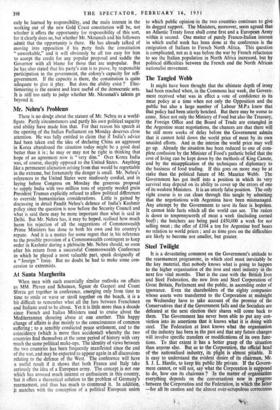At Santa Margherita
When men with such essentially similar outlooks on affairs as MM. Pleven and Schuman, Signor de Gasperi and Count Sforza get together in conference, emerging only from time to time to smile or wave or stroll together on the beach, it is a bit difficult to remember what all the fuss between Frenchmen and Italians used to be about. Yet it is little more than a decade since French and Italian Ministers used to cruise about the Mediterranean shouting abuse at one another. This happy change of affairs is due mainly to the consciousness of common suffering ; to a sensibly conducted peace settlement, and to the coincidence (which is more than accidental) whereby the two countries find themselves at the same period of history with very much the same political make-ups. The identity of views between the two countries has been frequently manifested since the end of the war, and may be expected to appear again in all discussions relating to the defence of the West. The conference will have a useful result if it shows that both France and Italy take seriously the idea of a European army. The concept is not one which has aroused much interest or enthusiasm in this country, but it offers a theoretical solution to the problem of Germany's rearmament, and thus has much to commend it. In addition, it matches with the conception of a political European union to which public opinion in the two countries continues to give its dogged support. The Ministers, moreover, seem agreed that an Atlantic Treaty force shall come first and a European Army within it second. One matter of purely Franco-Italian interest in which useful work has been done at the conference is the emigration of Italians to French North Africa. This question is complicated, not as it was before the war by French reluctance to see the Italian population in North Africa increased, but by political difficulties between the French and the North African nationalist movement.


































 Previous page
Previous page